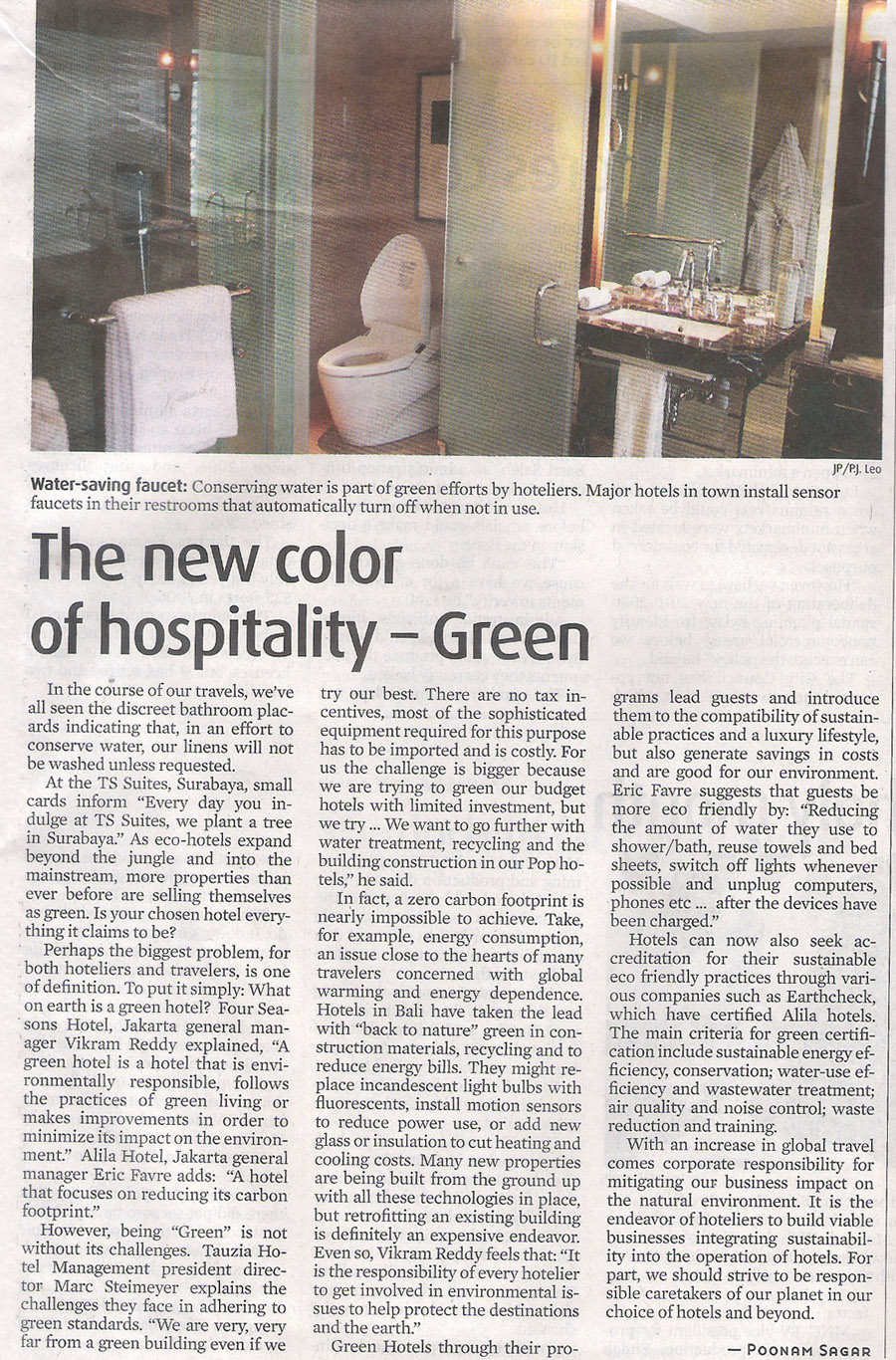 In the course of our travels, we’ve all seen the discreet bathroom placards indicating that, in an effort to conserve the water, our linens will not be washed unless requested. At the TS Suites, Surabaya, small cards inform ‘Every day you indulge at TS Suites, we plant a tree in Surabaya.’ As eco-hotels expand beyond the jungle and into the mainstream, more properties than ever before are selling themselves as green. Is your chosen hotel everything it claims to be?
In the course of our travels, we’ve all seen the discreet bathroom placards indicating that, in an effort to conserve the water, our linens will not be washed unless requested. At the TS Suites, Surabaya, small cards inform ‘Every day you indulge at TS Suites, we plant a tree in Surabaya.’ As eco-hotels expand beyond the jungle and into the mainstream, more properties than ever before are selling themselves as green. Is your chosen hotel everything it claims to be?
Perhaps the biggest problem, for both hoteliers and travelers, is one of definition. To put it simply: what on earth is a green hotel? Vikram Reddy, General Manager at Four Seasons Hotel, Jakarta explains “Green hotel is a hotel that is environmentally responsible, follows the practices of green living or makes improvements in order to minimize its impact on the environment.” Eric Favre, General Manager at Alila Hotel, Jakarta adds “a hotel that focuses on reducing its carbon footprint.“
However, being ‘Green’ is not without its challenges. Marc Steimeyer, President Director of Tauzia Hotel Management explains the challenges they face in adhering to green standards “We are very, very far from a green building even if we try our best. There are no tax incentives, most of the sophisticated equipment required for this purpose has to be imported and is costly. For us the challenge is bigger because we are trying to green our budget hotels with limited investments, but we try… We want to go further with water treatment, recycling and the building construction in our Pop hotels.“
In fact, a zero carbon footprint is nearly impossible to achieve. Take, for example, energy consumption, an issue close to the hearts of many travelers concerned with global warming and energy dependence. Hotels in Bali have taken the lead with “back to nature” green in construction materials, recycling and to cut down energy bills. They might replace incandescent light bulbs with fluorescents, install motion sensors to reduce power use, or add new glass or insulation to cut heating and cooling costs. Many new properties are being built from the ground up with all these technologies in place, but retrofitting an existing building is definitely an expensive endeavor. Even so, Vikram Reddy feels that “it is the responsibility of every hotelier to get involved in environmental issues to help protect the destinations and the earth.”
Green Hotels through their programs lead guests and introduce them to the compatibility of sustainable practices and a luxury lifestyle, but also generate savings in costs and are good for our environment. Eric Favre suggests that guests be more eco friendly by “reducing the amount of the water they use to shower/bath, reuse towels and bed sheets, switch off lights whenever possible and unplugging computers, phones etc … after the devices have been charged.“
Hotels can now also seek accreditation for their sustainable eco friendly practices through various companies such as Earthcheck, which have certified Alila hotels. The main criteria for green certification include sustainable energy efficiency, conservation; water use efficiency and wastewater treatment; air quality and noise control; waste reduction and training
With an increase in global travel comes corporate responsibility for mitigating our business impact on the natural environment. It is the endeavor of hoteliers to build viable businesses integrating sustainability into the operation of hotels. Both in our hotels and beyond, we strive to be responsible caretakers of our planet.
As published in The Jakarta Post – Wednesday, 10th Aug 2011




